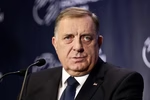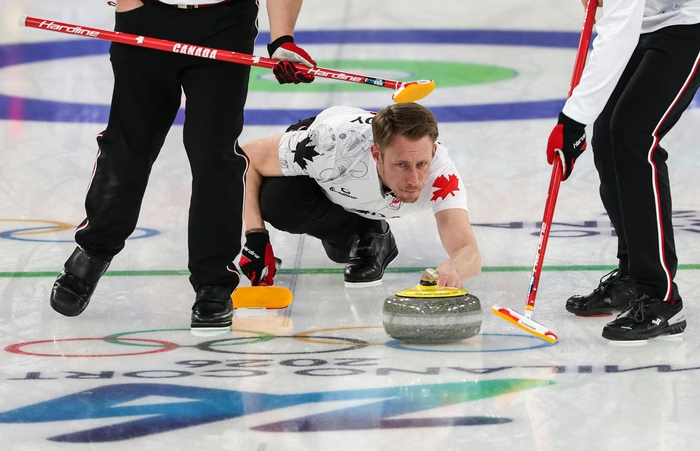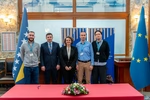
In a time when the political scene is still dominated by men, key advocates of institutional reforms are tirelessly working to transform this landscape. One of the leading experts on gender equality in politics, Lejla Mamut, reveals to N1 that the fight for gender equality is not just about quotas, but about the actual participation of women in decision-making processes.
With an overview of concrete strategies and initiatives, Lejla takes us through the challenges, achievements, and future steps that can reshape political life in Bosnia and Herzegovina.
An expert from the OSCE Mission in Bosnia and Herzegovina explained the specific strategies and initiatives implemented to increase women's participation in politics in Bosnia and Herzegovina.
"The OSCE Mission in BiH has been working intensively on increasing women's political participation for ten years," said Lejla.
"We work with political parties to change organizational culture, work policies, and strategies, allowing women to participate more significantly in decision-making processes. Working with political parties means working with both politicians and women politicians, but most importantly, it means working with party leadership, in close cooperation with women's forums within the parties," she added for N1.
The mission relies on standards prescribed by the Law on Gender Equality in BiH, which requires equal representation of men and women in state and local government bodies, corporate management bodies, political parties, and other organizations.
She identified the key obstacles women face in politics.
"Gender equality should not be seen as an occasional or incidental phenomenon but as an integral part of political life," said Lejla. "The obstacles are multiple and related to electoral design, prevailing cultural attitudes and stereotypes about women's roles, and male-dominated party leadership. Lack of voter support for women, violence against women politicians, and lack of intra-party support also pose serious problems," Mamut explains.
While it is important to ensure the recommended quota of 40% women in decision-making processes, Lejla emphasized that the share of women should not be the only goal.
"The goal is their actual impact on political processes through the allocation of positions of power," she stressed.
Lejla Mamut described how the OSCE Mission in BiH works with local political parties to promote gender equality.
"In 2017, the OSCE Mission in BiH conducted a review of gender work policies, structures, and cooperation modalities of the eight largest parliamentary political parties in BiH," she said.
As a result of this review, recommendations for improving gender equality in each party were offered. In 2018, the Mission developed a gender equality module for the educational programs of the four largest political parties. From 2018 to 2020, the Mission trained instructors within the parties, and in 2021, it assessed the implementation of the recommendations, finding improvements in internal procedures but also a need for further efforts.
"In 2022, the Mission organized advocacy activities at a high level with the parties," added Lejla.
"In cooperation with the Gender Equality Agency of BiH and ODIHR, an assessment of gender equality in political life across the country was conducted."
This year, the Mission organized a dialogue between the presidents of women's forums and representatives of 10 parliamentary political parties to agree on four principles of political engagement to eliminate violence against women.
"The text is finished and is expected to be published soon in the form of an open letter," she added.
In June 2024, the Mission, together with the OSCE Office for Democratic Institutions and Human Rights (ODIHR), organized a regional meeting on the role of men in politics in achieving gender equality.
"We recognized that there will be no further progress in women's political participation unless, alongside raising awareness, we actively engage men in politics in this idea," said Lejla.
The outcome of this meeting was an agreement to hold thematic training sessions at the state level. The first such training is already planned in Montenegro, and ODIHR will publish the 'Sarajevo Recommendations,' a document that will serve as a guide for future efforts.
Lejla Mamut also spoke about integrating gender equality and youth issues into the Mission's programs.
"The OSCE adopted its Gender Action Plan back in 2004," she said.
"Our Mission has developed four, and fully implemented three Gender Action Plans."
A significant part of the Mission's work focuses on addressing gender-based violence, especially following the alarming femicides in 2023.
"We facilitated dialogue between all relevant institutions, identified and began addressing necessary priorities," she added in an interview with N1.
The Mission supported police agencies in amending laws to ensure the temporary confiscation of firearms from households immediately after a domestic violence report. Furthermore, the OSCE expert noted that support was provided to direct legislative reforms towards the victim. The Mission also intensified engagement with parliamentary committees in the Federation of BiH, organizing thematic sessions on domestic violence.
Although BiH has made important strides in advancing gender equality, much work remains. With local elections around the corner, there is an opportunity for everyone, starting with political candidates, to demonstrate a genuine commitment to achieving this goal.
Kakvo je tvoje mišljenje o ovome?
Učestvuj u diskusiji ili pročitaj komentare





 Srbija
Srbija
 Hrvatska
Hrvatska
 Slovenija
Slovenija



























































